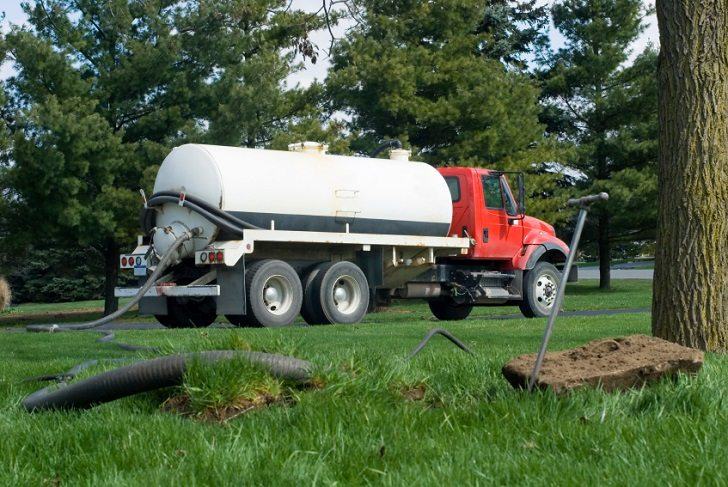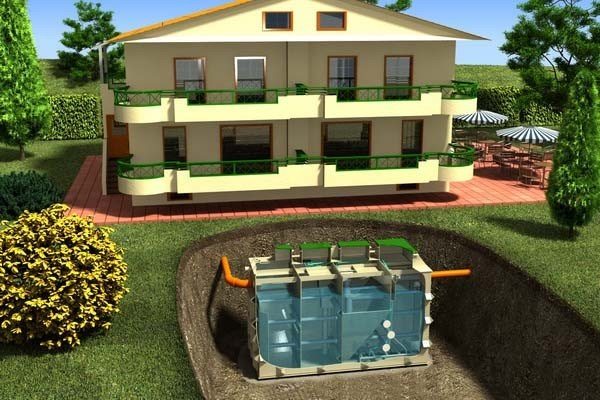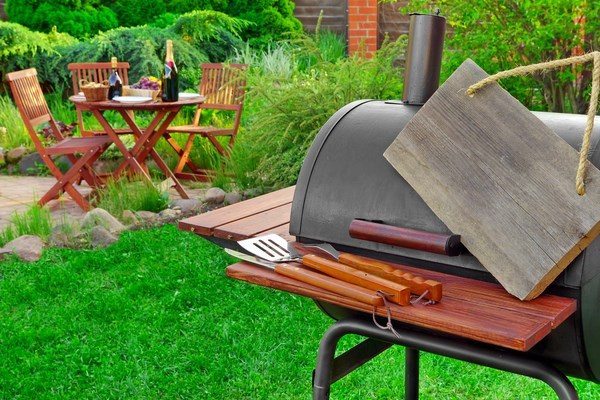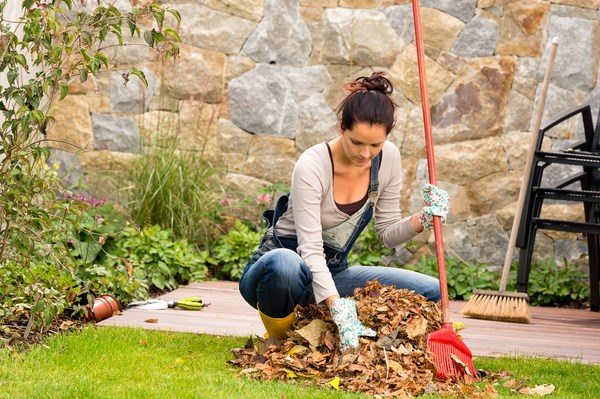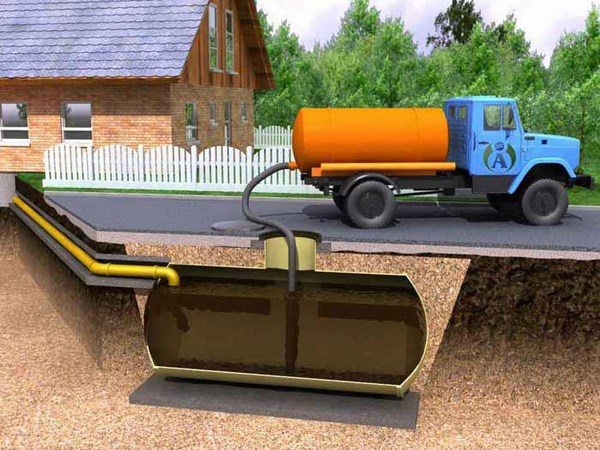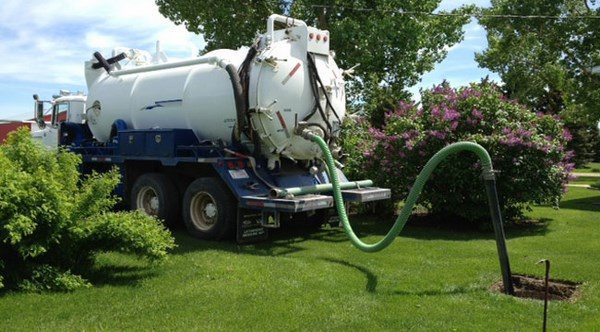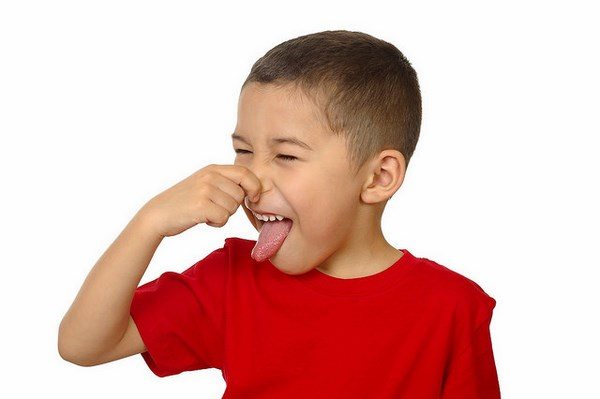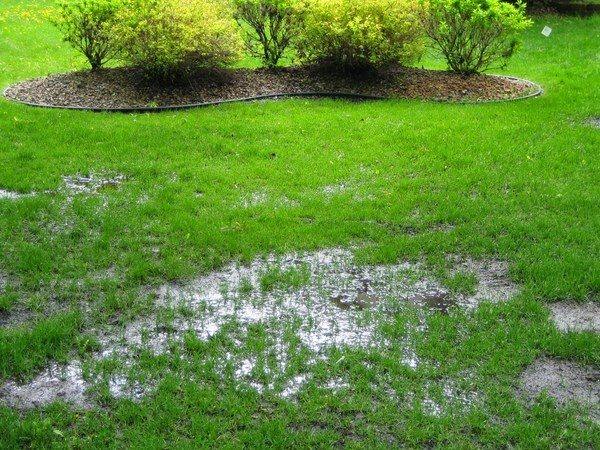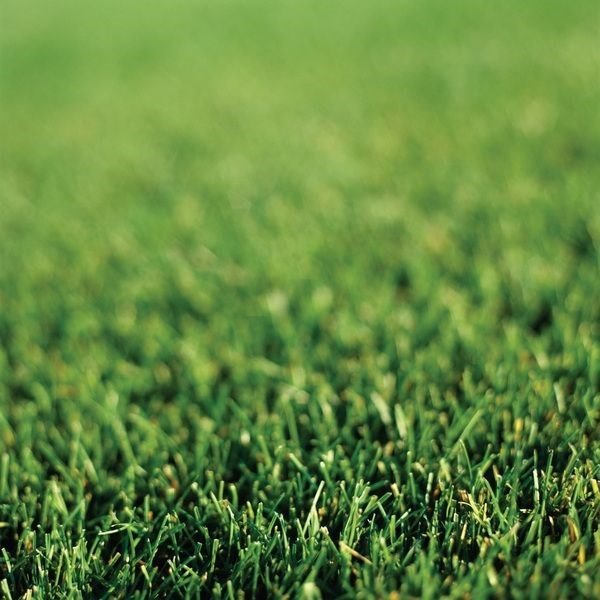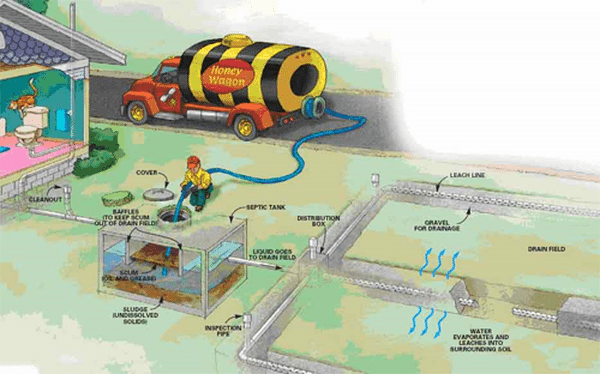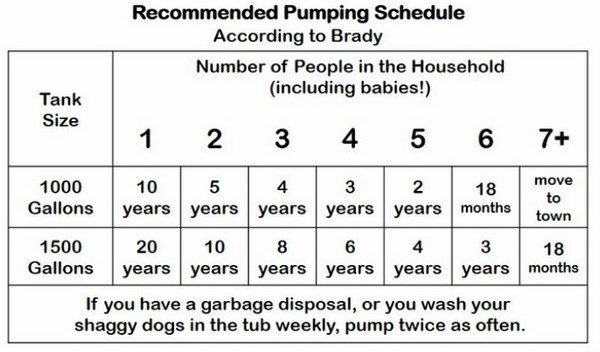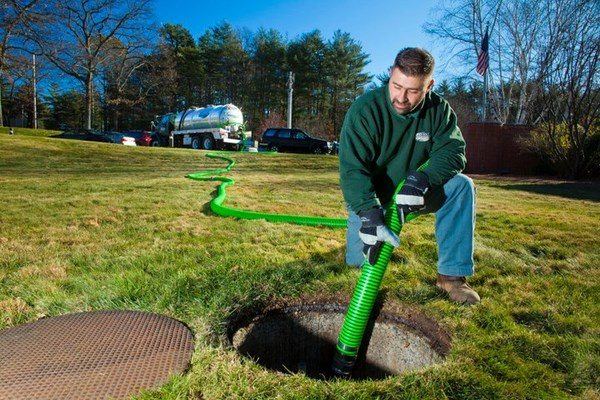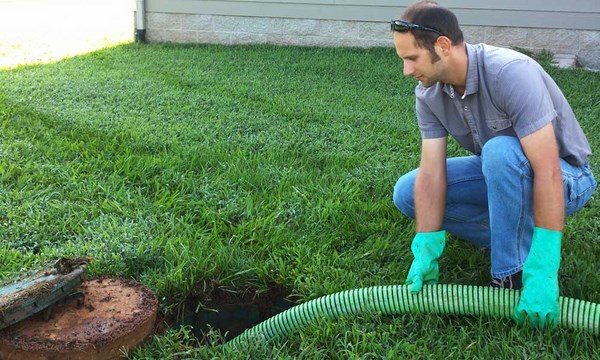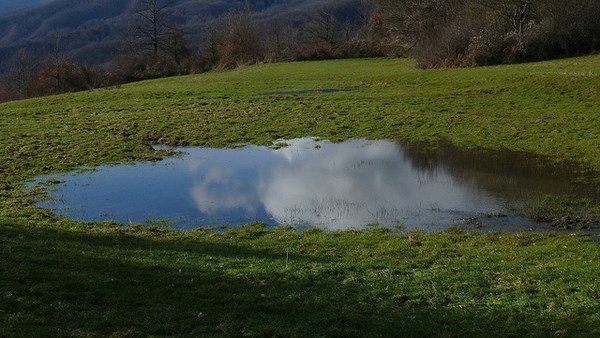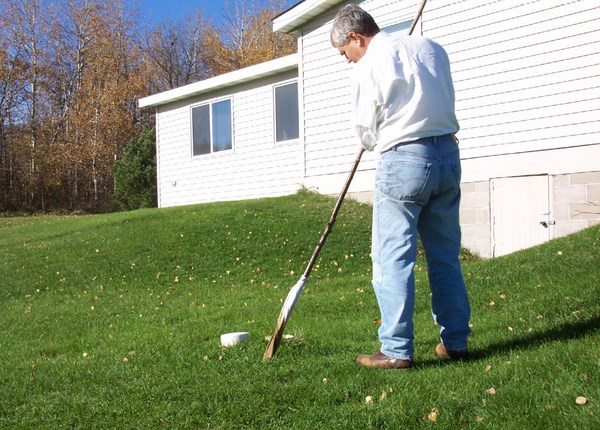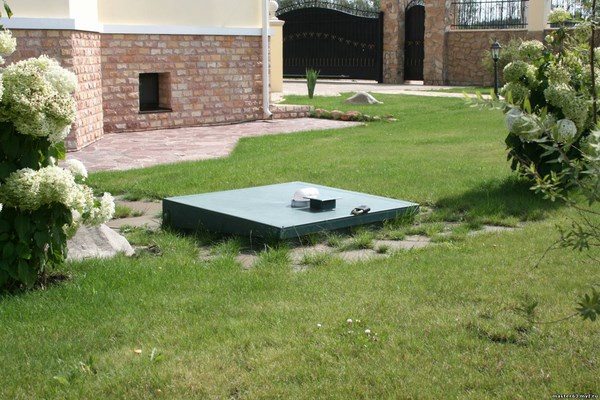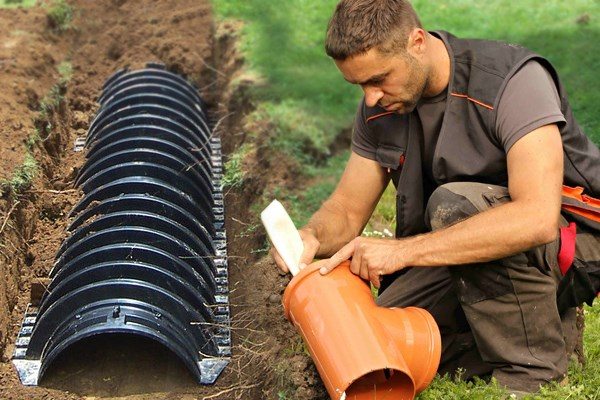Septic tank cleaning and maintenance are essential for the normal functioning of your septic system. A septic system collects and process all the wastewater from toilets, showers, sinks, washing machine, dishwasher, etc. in a household.
The simplest tank is a reservoir in which the waste water is collected. Tanks have different size, volume, and can be made of different materials. More complex models have two or three compartments where the wastewater is processed. No matter whether your system has a simple tank, a series of tanks or a modern septic system with an aerobic unit, every tank has three layers – a layer of solids which is at the bottom, also called sludge layer, a layer of clear liquid waste (effluent) and a layer of fats (scum) which floats on the surface of the liquid waste level. The principle of functioning of septic systems is based on discharging the effluent into a drain field (which is also called leach field) through perforated pipes. You can have the best system but it is inevitable that the layers of sludge and scum will build up over time. Here we come to the problem of septic tank cleaning and maintenance.
Septic tank cleaning and maintenance – items that you should never put down the drain pipes
Obviously, at some point after being installed your tank will need to be cleaned. Septic tank cleaning means that the sludge and scum should be pumped out and this should happen on a regular basis. However, there are some simple rules which will help you maintain your system functioning and avoid potential problems like clogs, even mechanical damages. You need to know your septic tank system and realize that anything that goes down the drain pipes will affect the work of your system. Here are some simple and practical tips which concern the maintenance and the good condition of your system.
Avoid placing heavy stuff on the ground above your septic system or drain field as this can seriously damage the tank and pipes.
Be mindful of the amount of water you use. The more water a household uses, the more water enters the tank. Being conscious about water use will save you money on bills, but will reduce the risk of failure of your septic system. You can reduce water consumption with some really simple steps like waiting for the dishwasher to be full before you run it, for example. Consider high efficiency toilets that use less water per flush compared to standard toilets.
You need to realize that anything that you pour down the sink, grind it in the garbage disposal or flush down the toilet goes to your septic tank and has a tremendous effect of the proper functioning of the system. The main rule to prevent potential problems is not to flush down the drain anything but human waste and toilet paper. There are many items that can cause clogs in the pipes and more important – that cannot be consumed by the bacteria in your system. Moreover, if you pour chemicals there is a real danger that you may kill the organisms which will be fatal for your septic system.
What should never go down the drain?
Never pour cooking oil or grease down the drain as they contribute to the layer of scum in the tank.
Household chemicals – gasoline, pesticides, antifreeze, solvents, chemical drain openers, toxic cleaners and paint or paint thinners, varnishes photographic solutions, pharmaceuticals, antibacterial soaps should not go down the drain either. Carefully use household cleaners and disinfectants and use them as per the instructions on the product labels.
Paper towels, wipes, cotton swabs, feminine hygiene products, diapers, dental floss or condoms should not enter the system either. Non-biodegradable solids do not decompose and remain in the septic tank.
Cigarette butts, cat litter, food remnants, coffee grounds, egg shells, nut shells, fruit pits will not decompose and besides the danger of clogging your pipes, you will fill your system with litter. It is wise to reduce the use of your garbage disposal as this will reduce the amount of solids and grease which may clog the pipes, the whole system and your drain field.
Septic tank and drain field maintenance also includes protection from mechanical damage. You should never drive or park vehicles over the drain field or the septic system. Patio furniture, grills, and any other heavy objects should not be placed over the tank and drain field either. Remember that the bacteria in your system needs oxygen to be able to break down the sewage, so do not use impermeable materials like asphalt, concrete or plastic over the drain field. Plants and trees should be planted at a distance from the septic system to avoid damages from roots.
As you see – these simple rules for the proper care of your system are based on common sense. It is important to understand that the septic tank and the drain field, as elements of your system, need a careful maintenance of the biological balance which is essential for the proper functioning of the whole system.
Septic tank cleaning – what are the most typical signs that the system needs pumping?
How to realize that you are faced at a septic system failure and it requires cleaning? There are some clear signs which should ring the bell to you so that you understand that the septic system is full and take the necessary actions.
Unpleasant odors are one of the first signs indicating for problems with the systems. In case you feel any odors outdoors (that is where you system is), it is a time to call for septic tank pumping.
Slow draining and gurgling sound in the toilet or the kitchen sink when the water drains are typically a clear sign of a clog. When these remain after you unclog the drain pipes, it means that your septic system is full.
Plumbing (sewer) backup is a definite sign that your septic tank should be pumped as soon as possible as it has reached its capacity. Usually these backups occur in the lowest drains, for example in the basement laundry room or bathroom.
Pooling water and muddy soil around the septic system which are not as a result of a heavy rain would be a sure sign that the system is overflowing and you should make sure the tank is pumped immediately.
Keep in mind that the grass should look the same everywhere on your lawn. Lush and greener grass around the drain filed is an indication that there is a leak in the septic system which may be due to the tank reaching its capacity or some mechanical damage.
Good practices and maintenance tips
The understanding how septic tanks work is the first step to make sure that you will not encounter pooling water, odors or any other unpleasant effects. As we said, the tank can be described as a large underground container, which is watertight, and where all the wastewater from your household is collected. The heavy solids in the wastewater settle to the bottom where bacteria degrade them to sludge and gasses and all the solids that cannot be decomposed remain at the bottom of the tank. Lighter solids as grease and fats float at the top and form a scum layer. The sludge at the bottom accumulates and requires periodic pumping otherwise they will overflow into the drain field. The usual period for pumping a septic tank is 3-5 years, but it depends on the size of the tank, its capacity, respectively, and the way the septic system is being used. Obviously, a septic system of a holiday house which is not permanently occupied will not require pumping as often as the one of a permanently occupied family house. Optimally, pumping is recommended when the solids reach 25% to 33% in the first compartment or main tank. You can check the level of solids by poking a pole through the scum level and move it carefully up and down.
Routine pumping will prevent much bigger problems and system failure. It is wise to have your system inspected once a year. People often forget when the septic system was inspected or pumped, so having a record of the system maintenance is a good idea. You can make a simple schedule and write down the activities. Water conservation greatly extends the life of the drain field and the proper functioning of your system. When in doubt, call a certified septic technician for help.
Cleaning methods – additives or pumping is better?
There are three main types of septic tank cleaning methods. One of them is using additives which come in two varieties on the market claiming to help systems work better – chemical and biological.
Biological additives for septic tank systems are harmless for humans and safe for the environment. They do not destroy the tank, contribute to lowering the level of sludge and prevent the emergence of hazardous gases and vapors. Typically, biological additives include yeast, bacteria, and enzymes and their beneficial effects on the system are still debated due to the fact that a variety of bacteria types, enzymes, microorganisms, fungi, etc. are present in the wastewater of the households anyway. Excessive biological activity in the septic tank may cause the formation of methane gas which pushes solids upwards and there is a potential danger of solids being carried to the drain field and cause clogging, harm the soil or contaminate the ground water.
Chemical additives for septic tank systems may contain hydrogen peroxide, formaldehyde, baking soda, and alum. However, experts advise to avoid using any chemical additives, especially caustic hydroxides and sulfuric acid, as there is a real danger of affecting the microbial population in your septic tank as well as the soil absorption system.
The market offers many additives but there are many studies that support the conclusion of experts, engineers and professionals that commercial septic system additives are useless, at best and harmful to your system, at worst. Bacteria resides in the wastewater anyway and unless you used a huge amount of bleach or another strong bacteria killer there is no need to restore the bacterial balance in a septic tank as it is a naturally balanced system.
The third method for septic tank cleaning is the pumping. Mechanical pumping is usually carried out by professionals who come with a pump truck which is connected to your system. The contents of the septic tank are removed and transported off your property. There are two main conditions for a successful pumping. The pump truck should be able to access your property and your tank should be deep maximum 3 meters deep. After the pumping process is finished, it is necessary to let a stream of clean water in the septic tank to check the bacteriological filters (if any) and remove fine solids.
There is a number of considerations which you need to keep in mind when planning cleaning and pumping. On a number of occasions septic tank pumping is not recommended.
When your property has been flooded by a heavy rainfall, storm or a river overflow you should wait until water levels are back to normal otherwise you risk a potential possibility of your tank floating, especially if it is made of plastic or fiberglass as these tanks are lightweight. Such a floating may cause pipe damage which will lead to additional repair expenses. Another potential danger when water levels around the septic tank are high is that floodwater may flow into the tank and fill it with debris, mud and dirt.
Pumping is not recommended when your tank is old or when you are not sure of the age of your tank. It is better to have the tank inspected before pumping to be sure that the construction will not collapse.
Do not pump your tank if the sludge level is very low unless you need to have it inspected or repaired. If you are not sure for the level of sludge, you can measure it or call a professional to measure it.
When you buy a property which has a septic system it is a good idea to inspect it for any potential damages. Usually homeowners arrange such inspections. Get informed when the system was installed, what types of tanks it has, the location of the system and the type of equipment. It happens that the owner has had the tank pumped before inspection but as good as it sounds this means that an empty system cannot be checked and inspected effectively.
Safety instructions for home owners
Whenever you plan any activities related to your septic system you need to follow some safety instructions and guidelines. Here are the most important ones:
You should never work alone when inspecting a septic tank. You may fall into the tank or breathe in toxic gases. Do not enter into a tank under any circumstances unless you are trained to do so whether you wish to inspect it, repair it, retrieve someone from the tank or perform any other action.
Never ignite flames near the septic tank as methane gas is explosive. This is one of the reasons why experts advise to place your garden grill and outdoor furniture in a distance. Do not leave tank covers open. Make sure that the lids and covers fit firmly. This will prevent potential risk of someone falling into the tank.
If you notice any damage on the septic tank covers, rust for example, make sure you replace them immediately. In case the tank inspection discovers any dangers and damages, make sure that the site is duly marked and roped off so that the access to the area is restricted until the septic system is repaired.
As we said above, when you have doubts that there is a problem with your septic system contact professionals who have the knowledge, experience and equipment to inspect your septic system and do the necessary repairs. Remember than safety always comes first!

